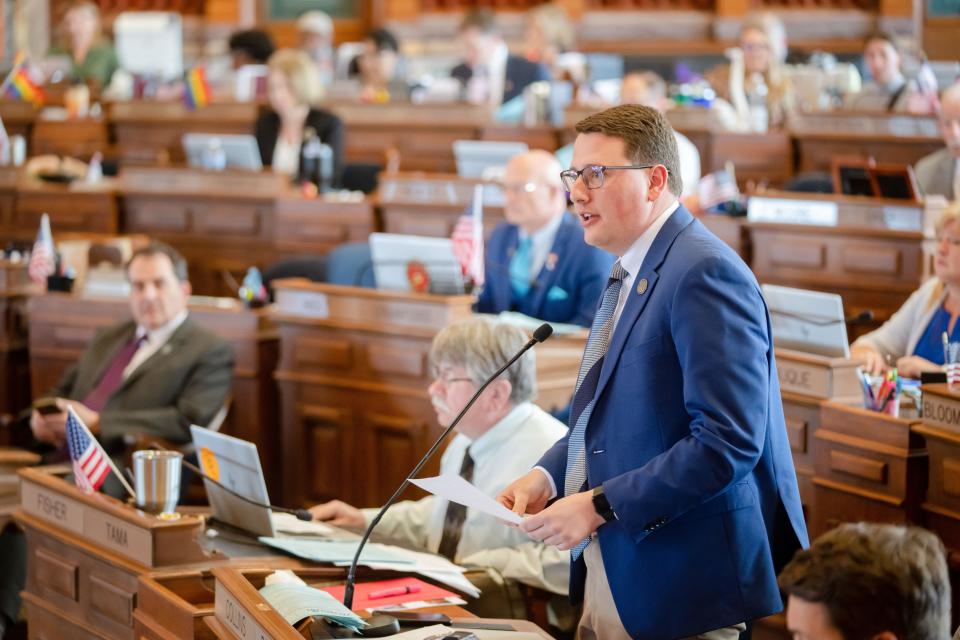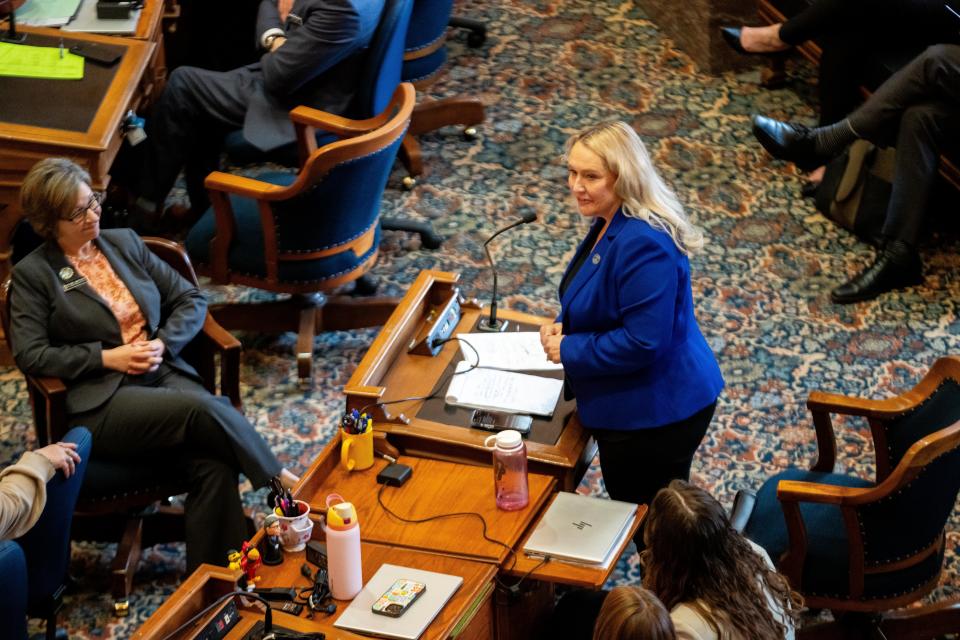Iowa House votes to ban DEI programs at public universities, cap in-state tuition hikes at 3%
Iowa House lawmakers voted Thursday to require Iowa's three public universities to eliminate all staff positions focused on diversity, equity and inclusion that are not necessary to comply with state or federal law and to cap in-state tuition increases at 3% per year.
The bill would also require the Iowa Board of Regents to include two state lawmakers as nonvoting members.
House lawmakers voted 56-39 Thursday afternoon to pass House File 2558, which Republicans named the "Higher Education Reform Act of 2024."
Six Republicans, Reps. Chad Ingels, R-Randalia; Shannon Latham, R-Sheffield; Brian Lohse, R-Bondurant; Brent Siegrist, R-Council Bluffs, and Ray Sorensen, R-Greenfield; and David Young, R-Van Meter, joined Democrats in voting against the bill.
The measure now goes to the Senate for consideration.
Much of the discussion focused on diversity, equity and inclusion programs at the University of Iowa, Iowa State University and the University of Northern Iowa.
"Whether they were created with good intentions or not, it has become clear that they now are ideological enforcement centers that suppress the pursuit of truth and, most importantly, merit," said the bill's floor manager, Rep. Taylor Collins, R-Mediapolis.

House Minority Leader Jennifer Konfrst, D-Windsor Heights, said she's concerned about the "political motivations" behind the bill.
"It clearly is a political bill," she said. "It clearly is a bill that creates more inefficiencies, increases costs, reduces services and puts the accreditation of our regents institutions at risk."
Lawmakers require University of Iowa, Iowa State, University of Northern Iowa to eliminate DEI staff positions
The legislation's language on diversity, equity and inclusion programs codifies a series of directives adopted by the Iowa Board of Regents in November.
More: Iowa Board of Regents tells UI, ISU, UNI to eliminate DEI positions not required by law
Those directives require the University of Iowa, Iowa State University and the University of Northern Iowa to restructure their university-wide DEI offices to eliminate any DEI functions not required for accreditation or to comply with the law.
The universities must also eliminate any other DEI-focused positions not necessary for those reasons.
And the three universities must take reasonable steps to assure that no student, employee, visitor or applicant is required to disclose their pronouns or to submit a DEI statement or participate in DEI initiatives.
The directives also require the universities to develop annual employee guidance for separating personal political advocacy from university business and to work to advance "the diversity of intellectual and philosophical perspectives in faculty and staff applicant pools."
And the universities must develop a policy "that prohibits the consideration of race and other protected class characteristics during the admissions process."
Iowa's public universities rely on the Regent Admission Index for applications, which does not consider race or gender.
The bill would also require community colleges to "adopt policies and procedures that prohibit the community college from discriminating against faculty, staff or students who do not ascribe to diversity, equity and inclusion ideologies."

Konfrst said the letters "DEI" have been politicized as a "boogeyman." But she said the concepts are those of fairness and including those who are different.
"I don’t think diversity, equity and inclusion is something we should be afraid of, we should be eliminating or we should be villainizing," she said.
In-state tuition increases at public universities would be capped at 3% per year
The University of Iowa, Iowa State University and the University of Northern Iowa would not be allowed to raise in-state tuition and fees by more than 3% each year without the approval of Iowa's Legislative Council.
For incoming in-state undergraduate students beginning in the 2024-25 school year, the universities would not be allowed to raise tuition on a class of students for four years, meaning most students would see the same tuition rate for their entire undergraduate experience.
The tuition freeze would not apply to out of state students, and there would be exceptions for students who enter the university with a significant number of credits, or who remain enrolled longer than four years.
The universities would also have to conduct a comprehensive review on how to reduce costs, maintain tuition at close to its current levels and keep "non-instructional costs" below 10% of the university's budget.
Konfrst said she has concerns about Republicans' proposal on tuition, although she appreciates the idea of a freeze.
"House Democrats introduced one as well," she said. "The difference is this one does not do anything to backfill that money, does not do anything at the regents institutions to ensure that they wont’ have to cut programs, that they won’t have to cut faculty, that they won’t have to cut things at that school."
Collins said he believes the universities would still be able to support their operations if they were limited to a 3% increase.
"I think the 3% increase is very reasonable for the students," he said. "It’s sustainable for the institution as well."
Board of Regents would include lawmakers as nonvoting members
The bill would expand the Iowa Board of Regents by adding two state lawmakers as nonvoting members of the nine-person board.
One lawmaker would be chosen by the Iowa Senate majority leader and one would be chosen by the House speaker.
It would also alter the process for choosing new presidents of the three public universities by requiring the Board of Regents to use a presidential search committee made up of members of the board.
The bill would keep confidential the identity of any candidate for a university president position by specifying that the person's identity is not a public record.
The Iowa Senate would also gain the power to confirm the president of the Board of Regents, who is chosen by their colleagues. Regents are already subject to Senate confirmation after being nominated by the governor.
Collins said having lawmakers included as nonvoting members on the Board of Regents "gives this body increased oversight" of higher education.
Rep. Adam Zabner, D-Iowa City, said the bill isn't focused on the issues facing students, like declining state funding for higher education.
"I talk to a lot of students at the University of Iowa, they make up a lot of my district and they often bring concerns about things that are happening in state government," he said. "Not one of them has ever said, 'What we really need is more politicians on the Board of Regents.'"
Board of Regents would have to approve any new administrator hires at UI, ISU, UNI
The Iowa Board of Regents would have to approve the hiring of any administrator positions at the University of Iowa, Iowa State University or the University of Northern Iowa.
The University of Iowa, Iowa State University and the University of Northern Iowa would not be able to hire any new administrator positions without the Board of Regents' approval.
The three universities would be able to fill open administrator positions with another administrator who is already employed at the university.
A new American history and civics requirement for public university graduates
All students at the state's public universities would be required to complete a course on American history and civics before graduating, if the bill became law.
The requirement would apply to all undergraduate students admitted during or after the 2024-25 school year.
"The curriculum shall focus on the founding of the United States and shall emphasize the Federalist Papers, the United States Constitution and the three branches of government," the bill states.
Stephen Gruber-Miller covers the Iowa Statehouse and politics for the Register. He can be reached by email at sgrubermil@registermedia.com or by phone at 515-284-8169. Follow him on Twitter at @sgrubermiller.
This article originally appeared on Des Moines Register: Iowa legislature: House votes to ban DEI programs at public colleges

